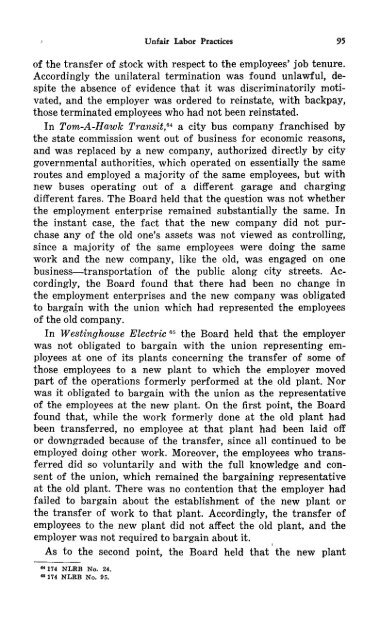1 - National Labor Relations Board
1 - National Labor Relations Board
1 - National Labor Relations Board
You also want an ePaper? Increase the reach of your titles
YUMPU automatically turns print PDFs into web optimized ePapers that Google loves.
Unfair <strong>Labor</strong> Practices 95<br />
of the transfer of stock with respect to the employees' job tenure.<br />
Accordingly the unilateral termination was found unlawful, despite<br />
the absence of evidence that it was discriminatorily motivated,<br />
and the employer was ordered to reinstate, with backpay,<br />
those terminated employees who had not been reinstated.<br />
In Tom-A-Hawk Transit, 64 a city bus company franchised by<br />
the state commission went out of business for economic reasons,<br />
and was replaced by a new company, authorized directly by city<br />
governmental authorities, which operated on essentially the same<br />
routes and employed a majority of the same employees, but with<br />
new buses operating out of a different garage and charging<br />
different fares. The <strong>Board</strong> held that the question was not whether<br />
the employment enterprise remained substantially the same. In<br />
the instant case, the fact that the new company did not purchase<br />
any of the old one's assets was not viewed as controlling,<br />
since a majority of the same employees were doing the same<br />
work and the new company, like the old, was engaged on one<br />
business—transportation of the public along city streets. Accordingly,<br />
the <strong>Board</strong> found that there had been no change in<br />
the employment enterprises and the new company was obligated<br />
to bargain with the union which had represented the employees<br />
of the old company.<br />
In Westinghouse Electric 65 the <strong>Board</strong> held that the employer<br />
was not obligated to bargain with the union representing employees<br />
at one of its plants concerning the transfer of some of<br />
those employees to a new plant to which the employer moved<br />
part of the operations formerly performed at the old plant. Nor<br />
was it obligated to bargain with the union as the representative<br />
of the employees at the new plant. On the first point, the <strong>Board</strong><br />
found that, while the work formerly done at the old plant had<br />
been transferred, no employee at that plant had been laid off<br />
or downgraded because of the transfer, since all continued to be<br />
employed doing other work. Moreover, the employees who transferred<br />
did so voluntarily and with the full knowledge and consent<br />
of the union, which remained the bargaining representative<br />
at the old plant. There was no contention that the employer had<br />
failed to bargain about the establishment of the new plant or<br />
the transfer of work to that plant. Accordingly, the transfer of<br />
employees to the new plant did not affect the old plant, and the<br />
employer was not required to bargain about it.<br />
i<br />
As to the second point, the <strong>Board</strong> held that the new plant<br />
64 174 NLRB No. 24.<br />
66 174 NLRB No. 95.

















